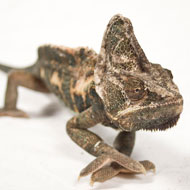Chameleons have highest mortality rates, study finds

New research suggests around 3.6 per cent of snakes, chelonians and lizards die during their first year in the home.
New research has found that 3.6 per cent of reptiles die in their first year in the home. But there is considerable variation among species - chameleons, for example, have mortality rates of nearly 30 per cent.
Scientists from the University of Kent carried out surveys of reptile keepers at two major herpetological events in the UK during 2013. They used direct questioning as well as additive Randomised Response Technique (aRRT) - a specialised technique for asking sensitive questions.
There is limited information on the mortality rates of reptiles, particularly after they are acquired by consumers. This is thought to be the first survey of its kind to assess reptile mortality rates in domestic consumers.
According to the findings, around 3.6 per cent of snakes, chelonians and lizards died during their first year in the home. Boas and pythons had the lowest mortality rate (1.9 per cent), while chameleons had the highest (28.2 per cent).
The majority of animals were captive bred, as opposed to wild caught - 97 per cent of snakes, 87 per cent of lizards and 69 per cent of chelonians acquired over the past five years were captive bred.
Researchers say there were indications that captive bred animals had lower mortality rates than wild caught animals, though more work is required to explore the difference between wild caught and captive bred individuals.
Previous research on reptile mortality rates has generated highly varied results. One study estimates the figure to be more than 75 per cent, based on the difference between the number of reptiles coming into the UK, compared to the estimated number in homes. Meanwhile, a recent questionnaire came up with an annual mortality rate of 3.25 per cent.
Researchers say much of the work carried out on the mortality rates of traded reptiles is outdated, based on isolated cases, focused on other parts of the supply chain (not in the home) or published in grey literature.
The team hope their findings, which have been published in the journal PLOS ONE, will help to inform the continuing debate on regulating the reptile trade, both nationally and internationally.
As popular exotic pets, reptiles account for 21 per cent of the value in the live animal trade. In the UK alone, the reptile sector is worth £200 million, with approximately 200,000 reptiles and amphibians bred each year.
Read the full research paper here: http://journals.plos.org/plosone/article?id=10.1371/journal.pone.0141460



 The RCVS has announced a new version of its 1CPD mobile app, with enhanced features for veterinary surgeons and veterinary nurses to record their continuing professional development.
The RCVS has announced a new version of its 1CPD mobile app, with enhanced features for veterinary surgeons and veterinary nurses to record their continuing professional development.